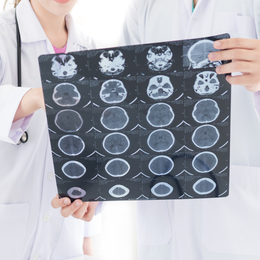
Positive Signs
Cutting-edge breakthroughs are paving the way for advanced neurological treatment.
There have been a number of exciting advances in the field of neurologic health. South Jersey Magazine recently caught up with some of the region’s leading experts to find out what’s new and how it is benefiting patients.
Psychological Health & Its Impact on Recovery
The understanding and hence, the treatment, for patients with various neurologic injuries has come a very long way. However, one important aspect of recovery that is not always taken into account is the individual’s psychological needs. Research continues to show the importance of considering various psychological factors when someone is recovering from a neurological injury—including howthose factors affect their ability to participate in treatment.
That’s where Bancroft, a leading regional nonprofit provider of programs and services for those in need of neurologic rehabilitation, is different. It has a number of psychologists on staff including Dr. Claire McGrath, PhD, ABPP who is senior neuropsychologist and supervisor of the neuropsychology team.
“The fact is treatment after a neurologic injury is not going to be as effective if the individual is not able to participate because of cognitive symptoms or emotional distress” explains McGrath, who, as a neuropsychologist, is often involved in assessing patients prior to treatment. “It won’t matter how good the therapist is, the treatment won’t be beneficial if the individual cannot participate. Whether we’re talking about stroke, brain injury, or even dementia, it’s so important that we don’t disregard the psychological impact of these conditions.”
In addition to working with patients, Bancroft is unique in that it also assists family members.
“Neurological events affect not only the individual but also the family members,” McGrath says. “So, it’s not uncommon for us to recommend psychotherapy for a family member who might be feeling overwhelmed or anxious.”
Since many rehabilitation outpatient clinics do not provide neuropsychological testing or psychology treatment, Bancroft truly is unique in its approach in which patient care is almost always approached as a team effort. Ultimately, McGrath says this emphasis on the “whole patient,” including their psychological health, really pays off.
“It doesn’t matter how good the medical interventions are—if the individual’s psychological health is struggling and you can’t get them involved in the treatment process, they aren’t going to have as good an outcome,” she says.
Hope for Migraine Sufferers
Migraine sufferers may finally be getting some relief with the FDA approval of a new class of migraine drugs. Migraines are characterized by intense pulsing or throbbing pain in onearea of the head accompanied by nausea and/or vomiting and sensitivity to light and sound. It is thought that nearly one in four adults in the United States suffers from these debilitating headaches.
But now, there is treatment hope.
“Today in neurology there are excitingnew discoveries which have revolutionized our treatment of headaches,” says Russell Abrams, MD, a neurologist with Relievus. “At the forefront of these new discoveries include the new CGRP (calcitonin gene-related peptide) inhibitors of which there are currently three products available including Aimovig, Ajovy and Emgality.”
These inhibitors work by blocking the effect of CGRP, which is a small protein that is highly prevalent in the sensory nerves that supply the head and the neck. Because CGRP is responsible for pain transmissions and levels increase during a migraine attack, CGRP inhibitors work to manage migraines.
However, before individuals can even think about treatment with one of these medications, they first must think about the proper diagnosis.
That’s not exactly a simple task as many neurologists do not have a subspecialty in treating headaches. But Abrams says that a proper diagnosis is key. While he says classic migraines have beenshown to respond well to CGRP inhibitors, research has shown that other types of headaches—such as tension headaches or cluster headaches—may not respond well to these drugs.
“Patients who have tried these medications so far have had an overall excellent response but that is not a substitution for a good evaluation,” he sums up.
Customized Disease Treatments
According to Steven M. Bromley, MD, FAAN, director of South Jersey MS Center and Bromley Neurology PC, the fields of neurology, immunology and oncology are among the most rapidly advancing specialties in all of medicine at this point—and that’s led to some exciting promises for treatment options.
“As our understanding of the brain and its function advances, we are also learning the uniqueness of an individual’s neurological disease and how to safely individualize a person’s treatment with advancements in infusible biological therapies,” Bromley explains. “Monoclonal antibodies are infusible proteins that are normally found in our bodies to help the immune system work and do its normal job of protecting us from infection and cancer. However, we now have the ability to craft new antibodies and ‘borrow’ the body’s own mechanisms to specifically treat disease. In other words, we can create an antibody protein that specifically targets and destroys a cell, protein or chemical process in a person’s body that is abnormal and causing the disease.”
According to Bromley, this area of medicine has become so advanced that they are now able to create antibodies that are unique to only one person’s cancer, using a process of “immunopharmacogenomics.”
“In other words, if John Smith’s cancer returns anywhere in John’s body, an infusion of John’s specific monoclonal antibody will hunt the cancer cells down and eliminate them without causing toxicity to the rest of John’s body, like chemotherapy does,” says Bromley. “This concept is phenomenal, but it doesn’t end there. This same pharmacogenomic process may help us identify a person’s cancer and highly effective treatments for that cancer before the cancer even starts— kind of like a vaccination for a person against their own cancer. This is our future meeting our present.”
To read the digital edition of South Jersey Magazine, click here.
Published (and copyrighted) in South Jersey Magazine, Volume 16, Issue 4 (July 2019).
For more info on South Jersey Magazine, click here.
To subscribe to South Jersey Magazine, click here.
To advertise in South Jersey Magazine, click here.












